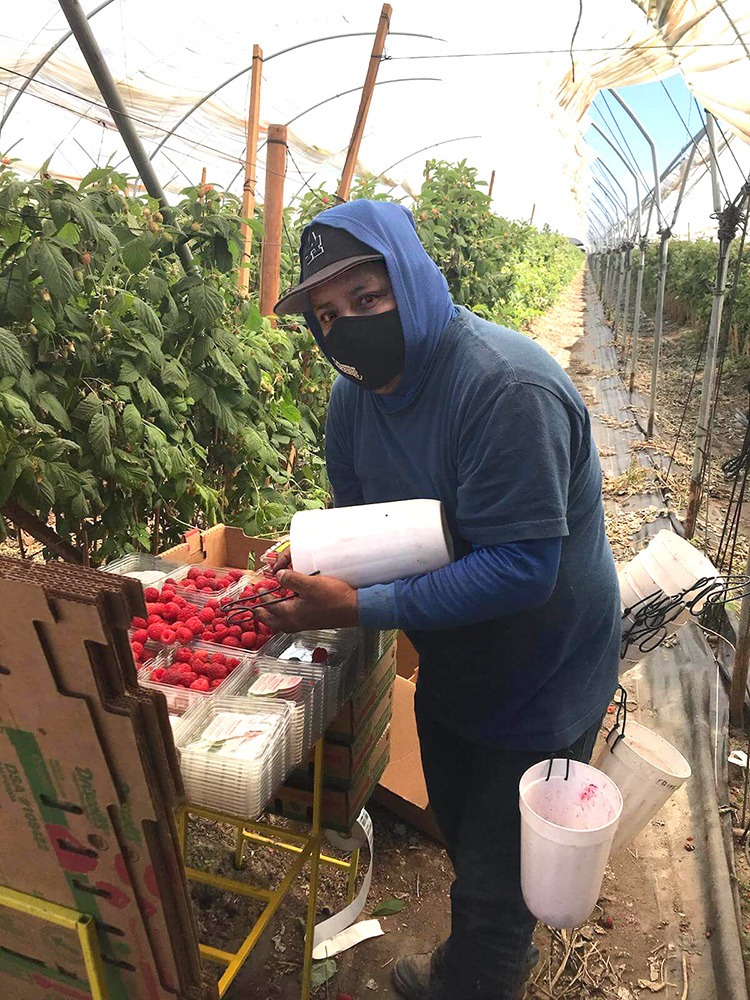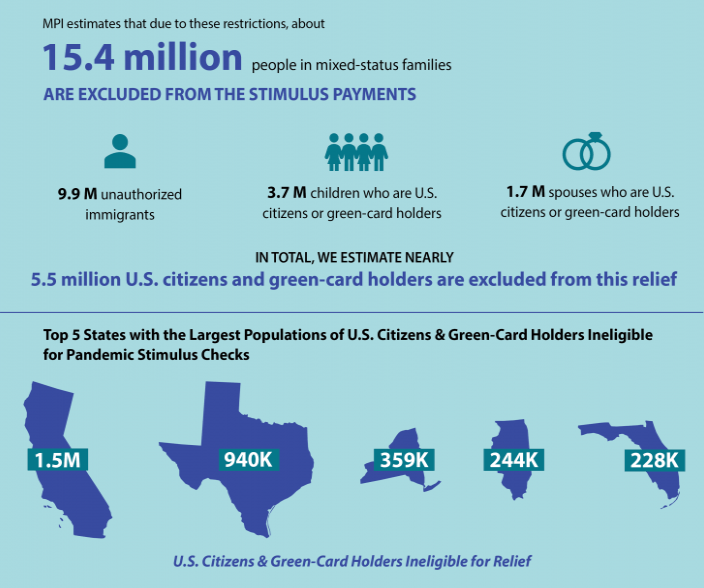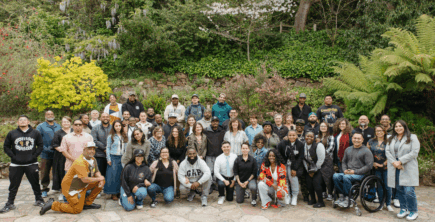
LGBT

Amid global uncertainty regarding the novel Coronavirus, one fact remains clear: COVID-19 does not discriminate against race, income, or job. And yet, we are witnessing the disproportionate impact of this pandemic on immigrant communities—over 11 million undocumented migrants across the United States. Although six million migrants are considered “essential” workers in roles such as agriculture, medicine, and transit, they lack equitable access to basic human rights like health care, money, and food.

Photo captured by Juvenal Solano
COVID-19 has laid bare a system rife with decades of discriminatory and oppressive practices towards undocumented immigrants, including their financial exclusion from the $2.2 trillion federal stimulus bill and ineligibility for unemployment insurance.
This global pandemic has further exposed the inequities and hardships that people of color more broadly have to unfairly endure. As critical frontline essential workers disproportionately exposed to the virus, immigrants and people of color are literally dying from their jobs—from a shameful lack of appropriate personal protective equipment (PPE), medical care, and other vital services.
Tides renounces these practices in the name of a more just and equitable society for undocumented immigrants—a majority of whom originate from Central America, Asia, the Caribbean, and Africa—who are being exposed, becoming ill, and dying at an alarmingly higher rate than white people due to the COVID-19 virus.
Financial stability is particularly relevant when considering the estimated 2.5 million undocumented immigrants who call California home and who comprise ten percent of the state’s workforce.

Josefino Cervantes Alvarado wears a bandana to serve as PPE, but gloves remain forbidden because the material from thorn tears might mix in with the fruit he picks.
Josefino Cervantes Alvarado is one of these undocumented workers. Six days a week the 40-year-old husband and father slips out of his two-bedroom apartment at 5:40 am to begin his workday. Arriving at the farm, he pulls on a long-sleeved sweater as protection from the pesticides and thorns before vigorously washing his hands—making sure to scrub for at least 20 seconds. Then he joins a team of 30 other undocumented men and women and spends the day picking berries under the hot Central California sun.
“I pray to God that I survive Coronavirus and that at some time we will become legal,” says Alvarado. “The United States needs us.”
Eighteen years ago, Alvarado left his village on the outskirts of Oaxaca, Mexico, for Ventura County with the goal of providing a better life for himself and his family. Today, he’s the father of four U.S. citizens, while remaining—not by choice—without citizenship for himself. Alvarado’s commitment to provide for his family is unwavering, even amid a global pandemic. “We are always working 52 weeks a year, whether there is a holiday or there is COVID because the bills are there and the rent doesn’t wait,” he explained. “We are risking our lives to win a piece of bread.”
Alvarado, who earned $32,000 in 2019 and regularly files his taxes, was excluded from receiving financial assistance out of the $2.2 trillion federal stimulus package. Any family with an undocumented individual is automatically ineligible for the $500 to $1,200 of support, despite having U.S. citizen children and regardless of laboring tirelessly every day to provide food for the nation during this crisis.
Anticipating millions of undocumented workers would not receive federal financial assistance during this crisis, immigrant rights groups quickly sprang into action. Increased deportations and threats against those with Deferred Action For Childhood Arrivals (DACA) status are part of a long list of recurring and discriminatory policy changes these communities have experienced in the past three years. These have all made migrants and migrant-serving organizations more resilient and more prepared for this pandemic.
As critical frontline essential workers disproportionately exposed to the virus, immigrants and people of color are literally dying from their jobs—from a shameful lack of appropriate personal protective equipment (PPE), medical care, and other vital services.
“The claps happening in the evening to support essential workers are nice, but these people need more than claps, they need real protections,” says Cristina Jiménez, Co-Founder and Executive Director of United We Dream, which launched the National Undocufund. This fund raised $120,000 within a week to provide $400 emergency spending cards to undocumented households. “After opening for applications, we reached capacity in seven minutes,” recalls Jiménez. “After ten minutes, we had over 1,360 families and individuals applying—more than double the amount of applications we could support. It was just heart-breaking.”

Graphic courtesy of Migration Policy Institute. For more information, read “Vulnerable to COVID-19 and in Frontline Jobs, Immigrants Are Mostly Shut Out of U.S. Relief” by clicking the image above
Recognizing the need for increased financial assistance, the State of California united with philanthropic organizations to make additional funding available. In mid-April the California Immigrant Resilience Fund was set up as part of a public-private partnership between Grantmakers Concerned with Immigrants and Refugees (GCIR) and Governor Gavin Newsom. Aligning with GCIR’s expected $50 million Resilience Fund, the governor recently announced a $75 million state-financed immigrant relief fund, the first of its kind in the nation. Tides was thrilled to support GCIR in developing and housing its critical Resilience Fund at Tides Foundation. The fund and its goal to provide grants to those organizations that are on the front line of supporting undocumented immigrants, including through cash assistance for undocumented individuals across California, are squarely aligned with Tides’ longstanding values of equity and justice.
Back in Ventura County, Alvarado is seeing a decrease in the amount of available work. He still shows up at the farm six days a week but is often finished by midday and is forced to turn to organizations like Mixteco Indigena Community Organizing Project (MICOP) for food to feed his family of six.
Any family with an undocumented individual is automatically ineligible for the $500 to $1,200 of support, despite having U.S. citizen children and regardless of laboring tirelessly every day to provide food for the nation during this crisis.
A few weeks ago, his employer provided workers with bandanas to serve as PPE, but gloves remain forbidden because the material from thorn tears might mix in with the fruit. And while new guidelines were introduced requiring workers to remain six feet apart, the risk of contracting COVID-19 is constantly on Alvarado’s mind, making him “scared and sad to go to work.” To protect his family, he has developed a routine that includes removing most of his clothes at the front door before washing his hands, taking long showers after work and relying on home remedies like special teas to help protect him from the virus.
“I pray to God that I survive Coronavirus and that at some time we will become legal,” says Alvarado. “The United States needs us.”
To date, Tides has mobilized over $3 billion for social change globally and facilitated nearly $40 million in funding supporting immigrants and refugees.
We stand alongside the 11-plus million undocumented immigrants and migrant-serving organizations across the United States, and call for justice in the face of COVID-19. We admire the resilience, perseverance and commitment that immigrants have demonstrated as they fight to stay healthy, stay alive and continue to call the U.S. home.
Tides invites you to donate to the California Immigrant Resilience Fund and help provide urgent support to this vulnerable community during this critical time.

LGBT

Corporate Partners

Philanthropy

Read the stories and hear the voices of social change leaders fighting for justice.